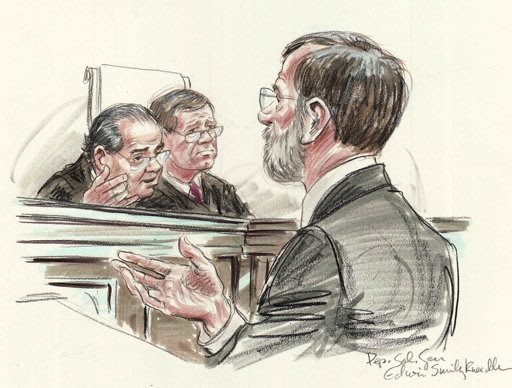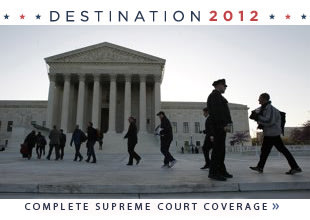Conservative Justice Antonin Scalia suggested on Wednesday that the Supreme Court could strike the "Cornhusker Kickback" from President Barack Obama's landmark health care overhaul without having to invalidate the whole law. He was right, in a way: The notorious provision isn't in the law.
The "Cornhusker Kickback" was the derogatory nickname of one of several sweetheart deals designed to ensure that the law had enough votes to pass. Amid a public uproar, lawmakers ultimately stripped the measure from the law.
But no one—not Scalia's eight colleagues on the highest court in the land, not Deputy Solicitor General Edwin Kneedler, there to represent Obama, and not the superstar lawyer challenging the law on behalf of 26 states, Paul Clement—challenged his claim.
Scalia's quip came on the third and final day of oral arguments before the court on what has come to be known as "Obamacare," and specifically on whether the justices could rule that the requirement that individuals buy insurance or pay a penalty was unconstitutional but not strike down the rest of the law.
Clement was arguing that the entire law had to go, and Scalia was gently challenging him.
"The consequence of your proposition, 'would Congress have enacted it without this provision,' OK, that's the consequence. That would mean that if we struck down nothing in this legislation but the—what's it called, the 'Cornhusker Kickback'—OK, we find that to violate the constitutional proscription of venality, OK?" Scalia said, to guffaws from the audience.
[Related: Supreme Court divided on whether Obama health care ruling must be all-or-nothing]
Scalia went on: "When we strike that down, it's clear that Congress would not have passed it without that. It was the means of getting the last necessary vote in the Senate. And you are telling us that the whole statute would fall because the Cornhusker Kickback is bad. That can't be right."
It isn't right.
Senate leaders had initially included about $100 million in federal Medicaid assistance for Nebraska as part of what aides said at the time was a plan to secure the support of one of the state's senators, Democrat Ben Nelson. But the ensuing controversy over the sweetheart deal—which saw Republican Senate Minority Leader Mitch McConnell's office coin the term "Cornhusker Kickback"—led even Nelson himself to argue that it be removed. Lawmakers stripped the arrangement from the law, replacing it with a far broader measure helping all states to expand Medicaid.
Scalia's comments came after two years of charges from the Tea Party that few, if any, people are fully familiar with what the law actually says. "Read the bill!" was a frequent chant at rallies against the measure before it passed. And Republicans have often mocked then-Speaker Nancy Pelosi's contention that "we have to pass the bill so that you can find out what is in it, away from the fog of controversy."
Scalia is a fierce defender of a doctrine of legal thought called "textualism," which aims to interpret laws according to the plain meaning of the language they use. Scalia once wrote that "a text should not be construed strictly, and it should not be construed leniently; it should be construed reasonably, to contain all that it fairly means."
The "kickback" quip wasn't Scalia's only joke about the text of the law. At one point, the blunt-speaking justice scoffed at Kneedler's suggestion that the justices could go through the measure to decide which provisions to spare in the event that they ruled the individual mandate unconstitutional.
Scalia expressed shock: "You really want us to go through these 2,700 pages? And do you really expect the court to do that? Or do you expect us to give this function to our law clerks? Is this not totally unrealistic? That we're going to go through this enormous bill, item by item, and decide each one?"
That led Justice Elena Kagan, an Obama appointee, to jab at her colleague a little later in the argument.
Kagan said the justices should "look at the text that's actually given us."
"For some people, we look only at the text. It should be easy for Justice Scalia's clerks," she added, to laughter from the audience.
Scalia had the last word: "I don't care whether it's easy for my clerks. I care whether it's easy for me."
More popular Yahoo! News stories:
• Why did Ann Romney put 'Anna Karenina' on her Pinterest board?
• Romney jokes about Santorum on 'The Tonight Show'
• Obama: 'If I had a son, he'd look like Trayvon'
Want more of our best political stories? Visit The Ticket or connect with us on Facebook, follow us on Twitter, or add us on Tumblr. Handy with a camera? Join our Election 2012 Flickr group to submit your photos of the campaign in action.
Nothing like having the best and brightest at the highest level of the American justice system. With knuckle-dragging blockheads like Scalia on the court, how is it possible for a country to prosper, let alone lead in this century? It hardly seems likely that there will be an honest debate about the legal issues when one of the strongest forces on the court isn't even paying attention to the details.
We should expect much more from the political class than this. From Olivier Knox at Yahoo News:Conservative Justice Antonin Scalia suggested on Wednesday that the Supreme Court could strike the "Cornhusker Kickback" from President Barack Obama's landmark health care overhaul without having to invalidate the whole law. He was right, in a way: The notorious provision isn't in the law.The "Cornhusker Kickback" was the derogatory nickname of one of several sweetheart deals designed to ensure that the law had enough votes to pass. Amid a public uproar, lawmakers ultimately stripped the measure from the law.But no one—not Scalia's eight colleagues on the highest court in the land, not Deputy Solicitor General Edwin Kneedler, there to represent Obama, and not the superstar lawyer challenging the law on behalf of 26 states, Paul Clement—challenged his claim.



No comments:
Post a Comment